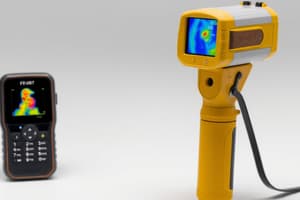Podcast
Questions and Answers
What type of input can a BMS provide into the fire system?
What type of input can a BMS provide into the fire system?
First-stage warning
Why is standard spot-type smoke detection not applicable to early detection of LIB failures?
Why is standard spot-type smoke detection not applicable to early detection of LIB failures?
Smoke is detected after thermal runaway.
What role does a BMS play in conjunction with other detection technologies in detecting fire conditions?
What role does a BMS play in conjunction with other detection technologies in detecting fire conditions?
Provides a better indication of the type of fire condition—either internal or external to the batteries.
Why should arranging and installing a battery rack assembly in configurations other than its tested and certified configuration be prohibited?
Why should arranging and installing a battery rack assembly in configurations other than its tested and certified configuration be prohibited?
What are some potential precursors to LIB failure that a BMS can monitor?
What are some potential precursors to LIB failure that a BMS can monitor?
Why is it important for all fire system components to be approved by local statutory authorities?
Why is it important for all fire system components to be approved by local statutory authorities?
What should be considered when detecting gas related to room explosion risks?
What should be considered when detecting gas related to room explosion risks?
What type of detection can provide off-gas detection in the early stages of lithium-ion battery thermal runaway events?
What type of detection can provide off-gas detection in the early stages of lithium-ion battery thermal runaway events?
Besides off-gas detection, what additional benefit does ASD detection provide?
Besides off-gas detection, what additional benefit does ASD detection provide?
Why is solely relying on lower explosion limit (LEL) sensors and cell voltage levels considered insufficient for detecting early stages of a thermal runaway event?
Why is solely relying on lower explosion limit (LEL) sensors and cell voltage levels considered insufficient for detecting early stages of a thermal runaway event?
What has been proven as the most reliable means of pre-thermal-runaway warning?
What has been proven as the most reliable means of pre-thermal-runaway warning?
What is one important aspect of protecting LIB systems in ESS?
What is one important aspect of protecting LIB systems in ESS?
What is thermal imaging technology used for in the context of early detection of LIB failure?
What is thermal imaging technology used for in the context of early detection of LIB failure?
Describe one limitation of thermal imaging technology in the context of monitoring battery systems.
Describe one limitation of thermal imaging technology in the context of monitoring battery systems.
How can first responders benefit from using thermal imaging in assessing the internal condition of the ESS?
How can first responders benefit from using thermal imaging in assessing the internal condition of the ESS?
Explain how thermal imaging technology helps in monitoring batteries during normal load or test.
Explain how thermal imaging technology helps in monitoring batteries during normal load or test.
What advantage do fixed-mounted thermal cameras have over handheld units in continuous temperature monitoring?
What advantage do fixed-mounted thermal cameras have over handheld units in continuous temperature monitoring?
How can the graphical data provided by fixed-mounted thermal cameras be useful in battery maintenance?
How can the graphical data provided by fixed-mounted thermal cameras be useful in battery maintenance?
Flashcards are hidden until you start studying
Study Notes
Battery Management Systems (BMS) and Fire Detection
- A BMS can provide inputs to fire systems, including battery status, temperature, voltage levels, and gas emissions to help detect early signs of failure.
Limitations of Standard Smoke Detection
- Standard spot-type smoke detectors are ineffective for early detection of lithium-ion battery (LIB) failures due to the delayed response to the unique particulate matter and gases released during failure events.
Role of BMS with Detection Technologies
- The BMS collaborates with other detection technologies to enhance fire condition detection, ensuring timely alerts and coordinated responses to thermal events in battery systems.
Prohibition of Non-certified Battery Rack Configurations
- Installing battery racks in configurations not tested and certified compromises safety and can lead to increased risks of failure and fire.
Monitoring Precursors to LIB Failure
- A BMS can monitor precursors such as temperature anomalies, voltage irregularities, charge/discharge rates, and unusual gas emissions, which indicate impending LIB failures.
Approval of Fire System Components
- Ensuring that all fire system components are approved by local statutory authorities guarantees compliance with safety standards and regulations, reducing fire risks.
Detecting Gas for Explosion Risk
- Detection of gas related to room explosion risks must consider factors such as gas concentration levels, potential ignition sources, and room ventilation to mitigate hazards effectively.
Off-gas Detection during Thermal Runaway
- Advanced gas detection systems can identify off-gases in the early stages of thermal runaway events in lithium-ion batteries, allowing for quicker intervention.
Benefits of Air Sampling Detection (ASD)
- In addition to off-gas detection, ASD systems provide early warning through continuous air sampling, enhancing safety monitoring by detecting minute changes in air quality.
Insufficiency of LEL Sensors and Voltage Levels
- Sole reliance on lower explosion limit (LEL) sensors and cell voltage levels is insufficient for detecting early thermal runaway stages, as these indicators may not show immediate abnormalities during early events.
Reliable Pre-thermal-runaway Warning Method
- The most reliable means of providing warnings before thermal runaway occurs is through continuous monitoring of battery temperatures using advanced detection technologies.
Protecting LIB Systems in Energy Storage Systems (ESS)
- An important aspect of protecting LIB systems in ESS is implementing robust thermal management systems to prevent overheating and potential failures.
Thermal Imaging Technology in LIB Failure Detection
- Thermal imaging technology is utilized for early detection of LIB failures by identifying hotspots and irregular temperature patterns in battery systems.
Limitation of Thermal Imaging Technology
- A limitation of thermal imaging technology is its inability to penetrate beyond surface temperatures, potentially missing internal faults within battery cells.
Benefits for First Responders
- First responders can leverage thermal imaging to assess the internal condition of the ESS, identifying areas of concern without needing to physically enter potentially hazardous environments.
Monitoring Batteries during Normal Load
- Thermal imaging technology aids in monitoring battery temperatures during normal load or testing, ensuring timely detection of anomalies that could indicate future problems.
Advantages of Fixed-mounted Thermal Cameras
- Fixed-mounted thermal cameras provide a continuous monitoring advantage over handheld units, ensuring real-time data collection and alerts for temperature variations in battery systems.
Utility of Graphical Data from Thermal Cameras
- Graphical data from fixed-mounted thermal cameras is beneficial for battery maintenance, enabling detailed analysis of thermal trends and proactive management of potential issues.
Studying That Suits You
Use AI to generate personalized quizzes and flashcards to suit your learning preferences.




